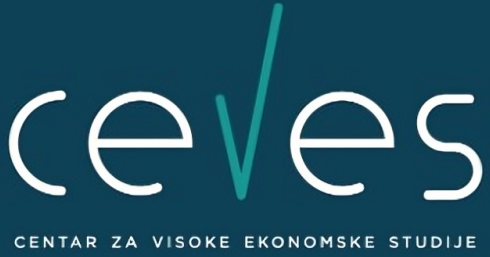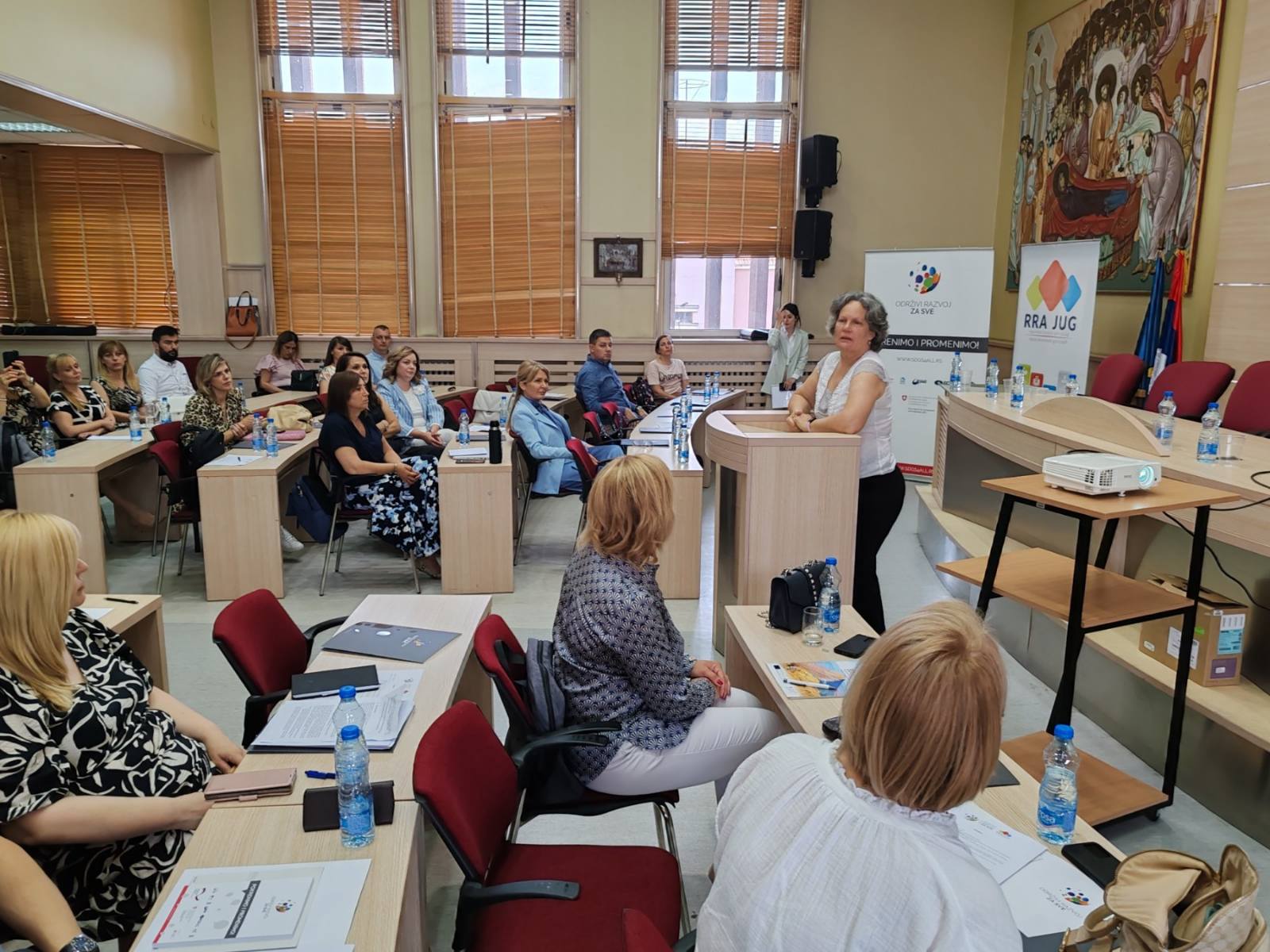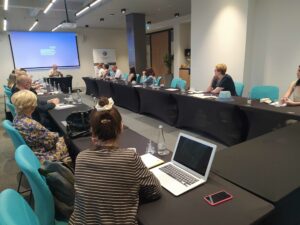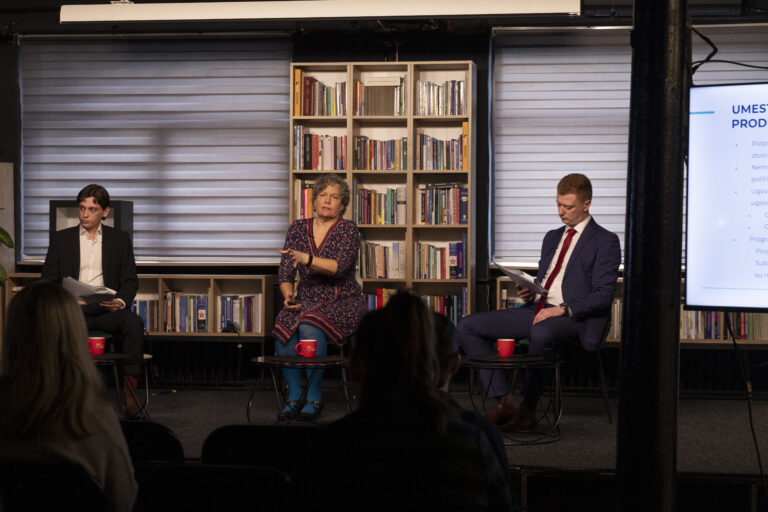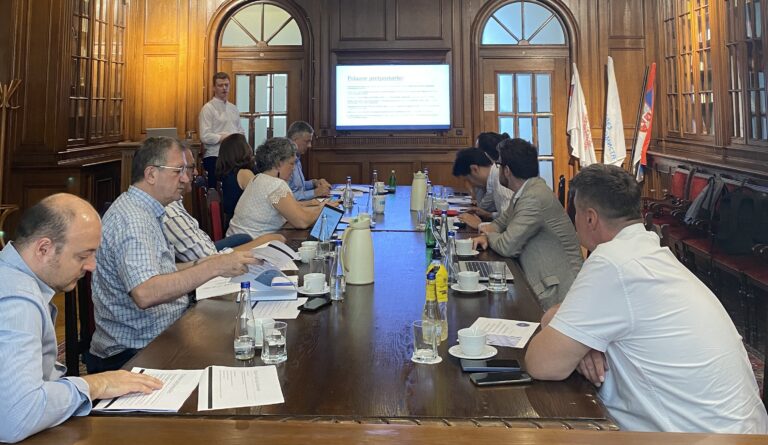Centar za visoke ekonomske studije CEVES je organizovao konferenciju „Ključni faktori održivosti lokalnog ekonomskog razvoja“ u Pirotu, 20. juna 2024. godine, u cilju razmene iskustava predstavnika Pirotskog, Topličkog, Nišavskog i Zaječarskog okruga. Konferencija je organizovana zajedno sa Asocijacijom za razvoj održivih zajednica TOC, u saradnji sa Regionalnom razvojnom agencijom JUG, u okviru Platforme „Održivi razvoj za sve“ koju podržavaju vlade Švajcarske i Nemačke, a sprovodi GIZ, u okviru projekta „Reforma javnih finansija – Agenda 2030“.
Konferencija je otvorena uvodnim obraćanjima gde su učesnike pozdravili zamenik gradonačelnika Pirota, Miloš Colić, predsednica Upravnog odbora i glavna ekonomistkinja CEVES-a, Kori Udovički, i menadžerka sektora za razvoj lokalnih samouprava RRA JUG, Nataša Andrejević.
Radni deo konferencije otpočeo je predstavljanjem CEVES analize „Osluškivanje tržišta – ključni faktor uspešnog razvoja“, koja je ukazala na važnost sagledavanja svih odlika, sličnosti i komplementarnosti privrede i ljudi, u cilju adekvatne analize regionalnog razvoja.
Panel pod nazivom „Kreiranje obrazovanja zasnovanog na potrebama tržišta rada: izazovi sprovođenja nacionalne agende, perspektiva lokalnih zajednica i očekivanja privrede“ okupio je učesnike u diskusiji o dosadašnjim naporima uloženim u prevazilaženje jaza između ishoda obrazovanja i tražnje na tržištu rada, glavnim rezultatima i poteškoćama, kao i planovima za budućnost. Panelisti su bili Gabrijela Grujić, direktorka Kancelarije za dualno obrazovanje i nacionalni okvir kvalifikacija, Miloš Colić, zamenik gradonačelnika Pirota, Marija Ćirić, direktorka Srednje stručne škole Pirot i Mira Zlatkov, direktorka ZIP centra Pirot, a panelom je moderirala Tatijana Pavlović Križanić, ekspertkinja za lokalni ekonomski razvoj. Diskusija je pokazala da su napori da se prevaziđe jaz između rezultata obrazovanja i potreba na tržištu rada vidni – razvijena je metodologija, identifikuju se sinergije između prosvete i privrede i kreiraju se programi, ali nedostaju brzina i omasovljenje rezultata.
Nakon panela, šefica Odseka za monitoring u GU Niš, Miljana Medarov-Vujaklija, je prisutnima predstavila proces izrade Dobrovoljnog lokalnog izveštaja o sprovođenju Agende 2030, po čemu je grad Niš prvi u Srbiji.
U drugom delu konferencije prisutni predstavnici opština i gradova iz četiri okruga imali su priliku da podele svoja iskustva po pitanju konkretnih inicijativa, važnih za lokalni ekonomski razvoj, a u skladu sa sve tri dimenzije Agende 2030. Učesnici konferencije su mogli da čuju više o regionalnim savetima koje je osnovala i podržava RRA JUG, kao i strategijama teritorijalnih investicija koje će omogućiti realizaciju važnih projekata usmerenih na unapređenje infrastrukture i obrazovanja u Pirotskom i Nišavskom okrugu. Predstavnik Dimitrovgrada, Dragan Mančev, je predstavio mogućnosti koje ova opština pruža privredi, poput revolving fondova, koji se sprovode i u drugim gradovima i opštinama, a koji omogućuju društveno odgovornim privrednicima i poljoprivrednicima kapital kojim oni mogu da unaprede ili započnu svoje poslovanje. Predstavnik Gadžinog hana, Aleksandar Ranđelović, je podelio iskustvo uspostavljanja zajedničke kancelarije ombudsmana sa gradom Nišem, kao primer kako kroz međuopštinsku saradnju male opštine mogu, uz manju količinu sredstava, da omoguće svojim stanovnicima zaštitu sopstvenih prava. U oblasti zaštite životne sredine, iskustvo uspostavljanja i funkcionisanja regionalne deponije u Pirotu je podelio načelnik odeljenja u gradskoj upravi, Bojan Pešić, te su učesnici imali priliku da čuju kako je izgledalo uspostavljanje međuopštinske saradnje između Pirota, Babušnice, Dimitrovgrada i Bele Palanke, u cilju uspostavljanja zajedničke deponije.
Konferencija je ukazala na potrebu za proaktivnom ulogom lokalne samouprave u cilju održivog razvoja svoje zajednice, koja podrazumeva neprestano osluškivanje potreba ljudi i privrede, te traganje za rešenjima za njihove probleme kroz iskustvo drugih gradova i opština ili saradnju sa njima.
